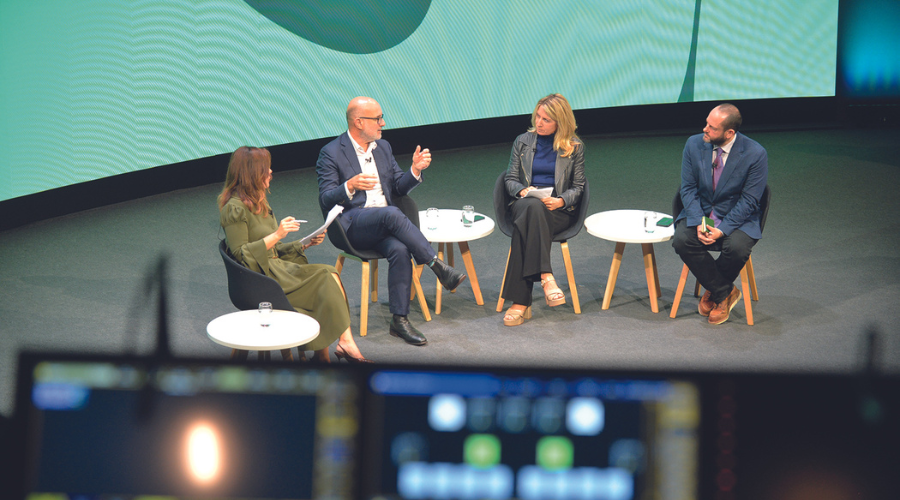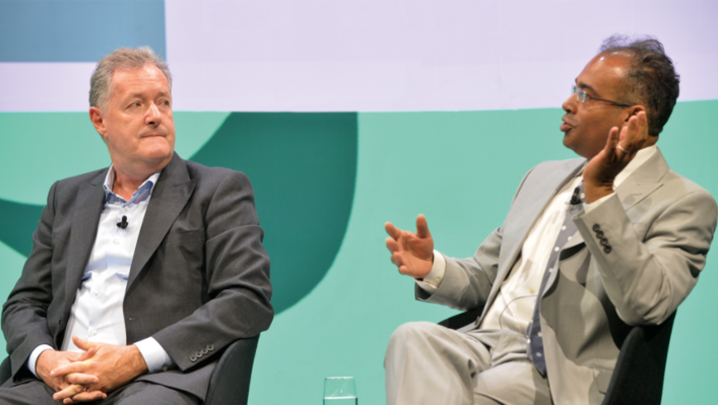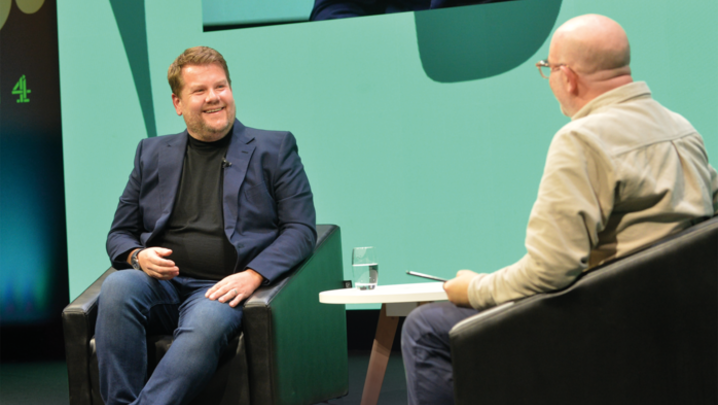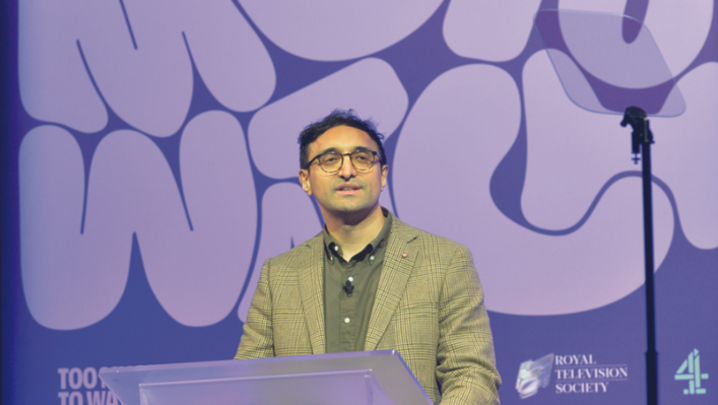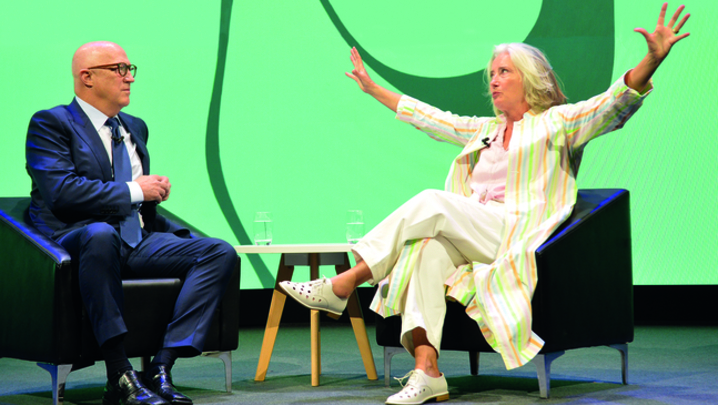TV news chiefs debate whether impartiality rules are still fit for purpose
The subject of regulation was highlighted in the second session on impartiality, which heard from the executives Angelos Frangopoulos (GB News), Deborah Turness (BBC News) and Jonathan Levy (Sky News).
GB News boss Frangopoulos was still smarting from a recent Ofcom ruling that his channel had breached the code by not including a wide range of views during a show in which presenters Esther McVey and Philip Davies, both Conservative MPs, assessed the Spring Budget. Moderator Barbara Serra added that several rulings against the broadcaster, also on the grounds of impartiality, particularly the mix of presenters and politicians, were pending.
Frangopoulos said: “We’re clearly disappointed by the decision by Ofcom. We chose to be regulated, we take the regulation seriously and we work closely with Ofcom as we work through each one of the cases they bring before us.
“In terms of the regulatory environment, we believe in it, we’ve signed up to it, but the word that is missing out of the description there is ‘due’ [as in ‘due impartiality’]. That’s a very contentious word because the ‘due’ is supposed to empower broadcasters and programme-makers to be able to apply a layer of appropriate impartiality and that is difficult to do when, ultimately, you’ve got a regulator that can basically say, ‘Well, we don’t think it was enough,’ no matter how much you can argue that, actually, we did have other views on that television programme.
“The reality is that we set out to disrupt, we set out to do things differently because we’re not creating content for this room or for other journalists, we’re creating content for the United Kingdom. The difficult truth for people to take on board is that the people of the United Kingdom wanted a service like GB News… we are here to do things differently.”
Deborah Turness, CEO, BBC News and Current Affairs, clarified that her division has an entirely different remit: “The BBC is paid for by all the people and must be there for the people.… We’re doing a very different job from the one that Angelos is doing.
“We’ve set out to really understand what impartiality means for today’s audiences, and… their needs are very different from a decade ago. It requires new things from us.”
Turness said the rise of fake news, disinformation and the audience’s resulting scepticism posed a bigger challenge for the corporation than it did for other TV news operators. “For the BBC, I feel the most important thing we can do is understand the needs of that sceptical audience so they can trust us. What our audiences want is clarity and a news brand they can trust.
“They want creative journalism holding power to account and asking difficult questions of all politicians and leaders who make decisions on behalf of the population. It’s critical today that sceptical news consumers understand the effort that has gone on in organisations that strive to be impartial to deliver that news they trust.
“The audience don’t talk about impartiality, they talk about fairness and respect. The BBC must deliver these and a sufficient mix of points of view so that we are representing the debate. We are the town square of this nation.… We are here to provide a service to every person who pays the licence fee.
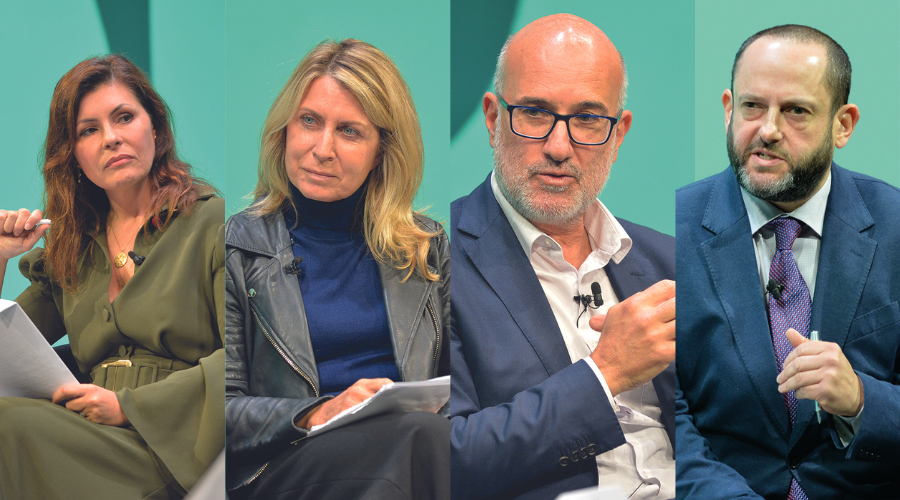
“I’ve worked in many media organisations and newsrooms, and I have to say in my time at the BBC, the effort it has gone to in ensuring that we are delivering that global gold standard in editorial quality is astonishing; the level of fact checking, the data analysis, the verification on any generated content that we use.”
She highlighted BBC Verify, the organisation’s newish fact-checking service: “We’re going to open up and show you the journalism and checking and verification that we do behind the scenes. We’re going to put that all upfront for you to see how we verify the content so you can trust it more.”
Turness and Sky News chief Jonathan Levy agreed that having politicians as presenters – such as McVey and Jacob Rees-Mogg, both hosts on GB News – would not be acceptable on their channels. Turness said: “I don’t think that represents the BBC’s values and what we’re there to do. If it’s on other platforms, it’s for Ofcom to decide whether or not that’s OK. Where it does happen, I think you have to make sure you are governed by a code and a set of frameworks – you are applying scrutiny, you are holding those others whom you might interview to account – and where that’s not happening, clearly there is a problem.”
Frangopoulos stressed that GB News was primarily a digital business, with a TV station and radio station attached. Hence, he said: “It allows us to treat content slightly differently on different platforms.… We are all about plurality, we’re not really competing with Sky News or the BBC, we are offering something different and a choice in the marketplace.… Journalism should be about debating, looking at all perspectives. The issue is this regulatory layer that actually weakens the ability of broadcasting and journalism to use their judgement in terms of what ‘due’ is.”
Levy disputed Frangopoulos’s claim that his more opinionated content was what audiences were after. “We have to be careful we don’t let this idea set in that there’s some kind of failure of what existed before Angelos and GB News came along. Millions of people watch Sky News and BBC News and the kind of news that you’re setting yourself against.”
Levy said his biggest challenge was that potential viewers were receiving their news from digital platforms, many millions more of them than those who watched linear TV.
Levy saw impartiality in a far more positive light than broadcaster Piers Morgan. He said: “Impartiality is just presented as a constraint, and Piers made a distinction between impartiality and getting to the truth; I think they’re connected. I see impartiality as open-minded, honest, curious, independent inquiry that leads you to the truth.”
He reminded the audience that, when Sky’s relatively new owner, Comcast, had taken over the channel, it had given a 10-year pledge guaranteeing the news channel’s editorial independence.
“I don’t think the ideal of impartiality is remotely anachronistic, I think, in a journalistic sense, that it is as important as it ever was.”
The second part of Session Eleven, ‘Impartiality – what’s the point?’, was chaired by Barbara Serra. The panellists were: Angelos Frangopoulos, CEO, GB News; Jonathan Levy, Executive Editor, Sky News UK; and Deborah Turness, CEO, BBC News and Current Affairs. The producer was Louisa Compton. Report by Caroline Frost.

